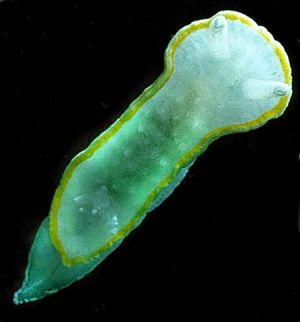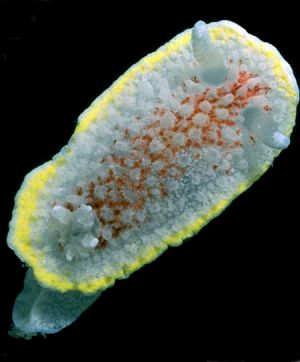Diaphorodoris luteocincta and var. alba
July 19, 2001
From: Bernard Picton


Hi Bill,
I just had another look at your page on this species and I want to disagree over the status of these two 'varieties'. I think they are distinct species. I've seen large numbers of var. reticulata but only a few var. alba over the years I've been collecting. Var. reticulata is common throughout the British Isles and extends north to Norway whilst var. alba only occurs as far north as the SW of England and South Wales. In the Mediterranean the reverse is true with alba being the common form and reticulata being scarce. As Patrick's excellent photographs show there are several colour and structural differences between the two. Apart from the obvious red in the middle of the back var. reticulata has a submarginal yellow band which is often slightly broken, whilst var. alba has a continuous band of orange-yellow which extends right to the margin. Var. reticulata has more papillae on its (wider) back which are much taller than those in var. alba. The body shape is different with var. alba much narrower and taller like a typical Hypselodoris and var. reticulata much flatter like a typical Chromodoris.
Tom Thompson claimed to have seen gradation between these forms, but I must disagree with him, they have always been very distinct when I've seen them and some divers have sent me var. alba pictures in the last few years saying that they find them distinctively different to the more familiar var. reticulata.
I've recently collected the two forms at the same dive site in the Scilly Islands and been able to compare them alive. I've also looked at the radulae but there is no difference there. I've attached photos of the animals from the Scilly Isles, Cornwall (Trinity Rock - April 2001)
UPPER: var. alba 8mm
LOWER: var. reticulata 10mm.
The only question in my mind is should we call the white form (alba) Diaphorodoris alba or should it get a new name altogether? I see that the rules of nomenclature say a variety name given before 1961 can be treated as subspecific and therefore be available unless the author categorically says that infrasubspecific rank is meant, in which case it may still be used if the name has been treated as available or used for a species or subspecies before 1985! (1985 code, article 45g).
Bernard
bernard.picton.um@nics.gov.uk
Picton, B., 2001 (Jul 19) Diaphorodoris luteocincta and var. alba. [Message in] Sea Slug Forum. Australian Museum, Sydney. Available from http://www.seaslugforum.net/find/4838Dear Bernard,
It's a pity you couldn't find some nice morphological difference in the radula. Are they both found together on the same bryozoans? I see Thompson & Brown report a flattened egg ribbon. It would be nice to know if both 'varieties' had the same shaped egg ribbon.
I agree that the external differences certainly look real but it would be useful to have some correlating evidence - either biological or anatomical.
I also agree that the nomenclatural problem needs sorting out. Firstly I guess you have to resolve whether Portmann & Sandmeier used 'variety' as an infrasubspecific term or as a category equivalent to subspecies. If the latter, then Thompson & Brown (1984) cite the names as Diaphorodoris luteocincta alba and Diaphorodoris luteocincta reticulata in a form suggesting they consider the names to have have subspecific equivalence, which would suggest 'alba' is available. But you would need to check this out.
In the meantime I will sit on the fence and keep both 'forms' together - but I note your views at the top of the page. And of course if anyone has views, photos, evidence about this, it would be very welcome.
Cheers,
Bill Rudman
Related messages
-
Diaphorodoris luteocincta from Portugal
From: Joao Pedro Silva, April 23, 2008 -
Diaphorodoris luteocincta with a strange spot
From: Dominique Horst, April 23, 2008 -
Re: Diaphorodoris luteocincta from France
From: Dominique Horst, April 17, 2008 -
Re: Diaphorodoris luteocincta from France
From: Dominique Horst, June 25, 2007 -
Diaphorodoris luteocincta from Croatia
From: Andrej Jaklin, June 10, 2006 -
Diaphorodoris luteocincta spawn?
From: Jim Anderson, April 14, 2006 -
Diaphorodoris luteocincta from Turkey
From: Ferda Buyukbaykal, August 25, 2003 -
Onchidoris luteocincta breeding habits
From: R.J. Wright, March 18, 2003 -
Diaphorodoris luteocincta from France
From: Marina Poddubetskaia, July 30, 2002 -
Re: Diaphorodoris luteocincta from Turkey
From: Juan Lucas Cervera, June 14, 2002 -
Diaphorodoris luteocincta from Turkey
From: Baki Yokes, June 8, 2002 -
Re: Photos of Diaphorodoris luteocincta
From: Juan Lucas Cervera, March 6, 2001 -
Photos of Diaphorodoris luteocincta
From: Patrick Hertaux, March 4, 2001
